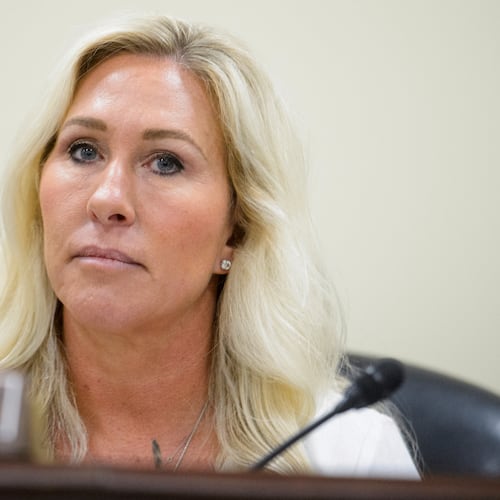The messy public breakup between President Donald Trump and U.S. Rep. Marjorie Taylor Greene marks the collapse of an alliance that has helped define MAGA politics and could have consequences for Georgia Republicans headed to a volatile midterm.
Once synonymous with Trump’s political movement, the president late Friday broke ties with Greene, calling her “wacky” and accusing her of going “far left,” adding that he would back a primary challenger in her northwest Georgia district “if the right person runs.”
Greene fired back that Trump had “attacked me and lied about me,” and asserted that a text she sent earlier about the files of convicted sex offender Jeffrey Epstein “sent him over the edge.”
“I have supported President Trump with too much of my precious time, too much of my own money, and fought harder for him even when almost all other Republicans turned their back and denounced him,” she wrote. “But I don’t worship or serve Donald Trump.”
A spokesperson for Greene said she was unavailable for an interview and her posts on X were her official responses to Trump.
The split marks an emphatic end to a political alliance that stretches to 2020, when Greene captured a deep-red northwest Georgia seat with a pledge to be an unwavering supporter of the president and the “worst nightmare” for Democrats.
Now, though, she has emerged as one of the most forceful GOP critics of the president and his allies — an unlikely metamorphosis that’s put her in league with Democrats opposing health care cuts and other mainstays of Trump’s policy.
Saturday, she continued that approach, advocating for a “new way forward” that ascribes to an America First, America Only policy.
“I believe in the American people more than I believe in any leader or political party and the American people deserve so much better than how they have been treated by both sides of the aisle.”
Metamorphosis?
While Greene has had scattered criticism for parts of Trump’s agenda before, the fissures sharpened in May when Greene ruled out a bid for Senate with a scathing post that excoriated establishment politicians she said were too willing to compromise their values.
Weeks later, she also ruled out a bid for governor in a blunt 624-word message that torched the “good ‘ole boy system” she blamed for endangering Republican control of Georgia.
It was welcome news to critics who worried her scorched-earth history could splinter the coalition of moderates and conservatives that powered past GOP victories — and fragile enough that its undoing helped usher in Democratic gains earlier this decade.
Indeed, U.S. Sen. Jon Ossoff had openly goaded her to run against him next year, questioning whether she has the “guts to do it.” A May AJC poll showed him with a 17-point edge over Greene in a one-on-one matchup.
Credit: Arvin Temkar/AJC
Credit: Arvin Temkar/AJC
But the internal pushback on her statewide ambitions also set her on a path of open objection to her party. Trump confirmed longstanding buzz that the rift deepened when “I sent her a poll stating that she should not run for Senator, or Governor, she was at 12%, and didn’t have a chance.”
In the weeks since, she has put more populist persona on display, marked more by disagreements with GOP leaders and less by the conspiracy theories and confrontations that once fueled her rise.
Her best-known policy disagreement centered on the record-long government shutdown that just ended. She joined Democrats to champion an extension of Affordable Care Act subsidies set to expire at the end of the year, and criticized Republicans for not addressing health care needs.
Credit: ABC
Credit: ABC
“I’m saying that this is such a severe problem that it’s crippling Americans’ abilities to make ends meet, and it’s a failure by Republicans to not recognize it and to not be working on a solution,” Greene told The Atlanta Journal-Constitution in a recent interview.
Trump and Greene have not spoken recently, she told reporters earlier this week. Their last public appearance together came in June when she sat in his box to view the military parade on his birthday.
By that time, she had already begun publicly disagreeing with his position on the Epstein files and Israel’s war with Gaza, among other matters. But Greene initially avoided criticizing the president directly, blaming their rift on bad advice she said he was receiving from advisers.
Her metamorphosis has been accompanied by a charm offensive on national media sites that peaked with appearances on “The View” and the “Real Time with Bill Maher” earlier this month, where she said she’s long felt her opinions were misunderstood.
“You’ve only seen me in clips and in headlines,” she said. “And that’s not fair.”
‘Elephant in the room’
Greene has warned that Republicans could be on track for widespread defeats in next year’s midterms if they continue on this trajectory — a worry heightened last week after Democrats scored landslide victories to flip two Public Service Commission seats.
The third-term Republican could also face a more concerted election challenge in her Rome-based district with Trump’s open call for a primary opponent.
He wrote on social media that he’s heard from supporters in her district “fed up with her and her antics and, if the right person runs, they will have my Complete and Unyielding Support.”
Since defeating Dr. John Cowan, a Rome neurosurgeon, in a 2020 runoff, Greene has steamrolled all challengers from both parties. A tweaking of her district to include a diverse swath of deep-blue Cobb County precincts had little effect.
Still, it’s unclear whether Trump’s promise to back a primary challenger will shift the dynamics next year. He has similarly targeted Kentucky Rep. Thomas Massie, a conservative Republican who has repeatedly broken with Trump on legislation and teamed with Democratic Rep. Ro Khanna of California to push for the release of the Epstein files.
Massie, first elected in 2012, has easily won reelection every cycle. He won his 2024 primary with 76% of the vote without the president’s endorsement and despite two other names appearing on the ballot. Trump has endorsed a Massie challenger for 2026.
Greene did not face a primary challenger in 2024. In 2022, she carried the primary with 70% of the vote against five GOP opponents. She has consistently dominated in the general election in her deeply conservative district.
Greene and Massie have also resisted trading personal insults with Trump, keeping their disagreements with the president focused on policy. Massie said earlier this year that he has learned to navigate the ebbs and flows of his relationship with Trump.
“There are a lot of people who love Trump, who love me,” he told the AJC this summer. “And just because Trump’s mad at me, that’s not going to change their vote for Trump or me.”
Trump’s intervention could still encourage a challenger, though none has yet stepped forward. Cowan declined to comment Saturday. So did another potential candidate, far-right state Sen. Colton Moore, who posted that he was “proud” of Trump and ribbed Greene for not returning his calls.
Greene’s allies insist she will endure. Matt Stout, a field operative who has worked for Greene and other Republicans, said Trump could be trying to distract from the ongoing scrutiny of the Epstein documents.
“And that is the elephant in the room right now.”
Keep Reading
The Latest
Featured







